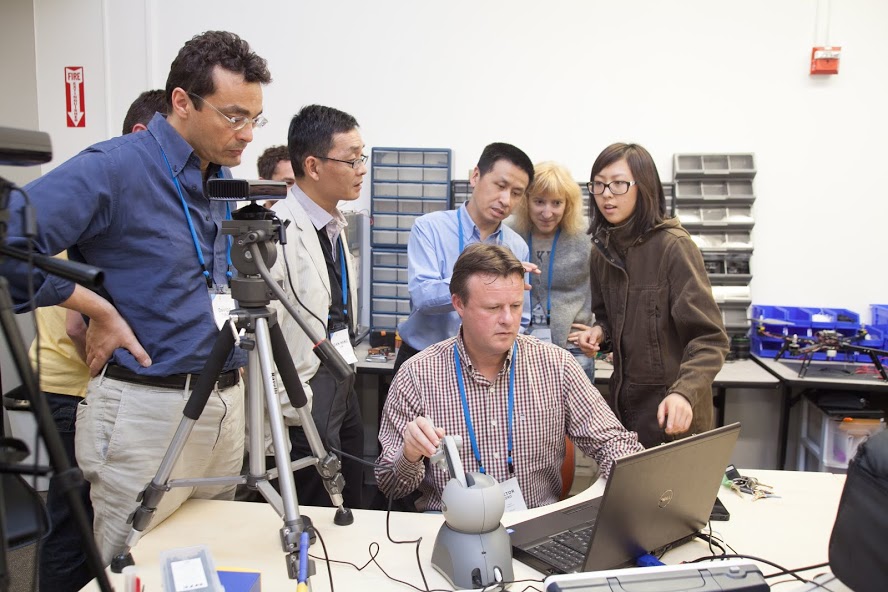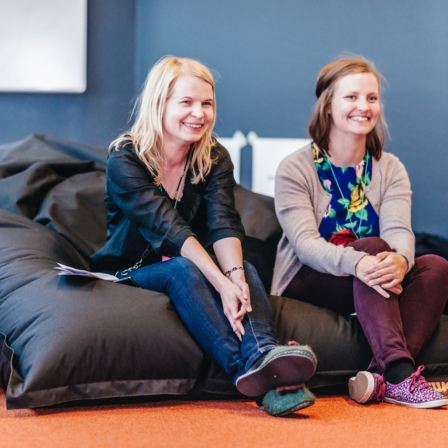The mission of Singularity University is based on the understanding of the world’s biggest challenges and their solution with the help of exponential technologies.
“Our mission is to educate, inspire and empower leaders to apply exponential technologies to address humanity’s grand challenges.” This is how Singularity University describes itself. It is a training and futures organisation founded by research scientists Ray Kurzweil and Peter Diamandis, located in the NASA Research Park in California’s Silicon Valley.
Each summer, Singularity University organises a 10-week Global Solutions Program (GSP). Participants from 45 countries attended last summer’s course. The course is not open to everyone: the participants must demonstrate their motivation and ability to carry their own world-improving business idea to the implementation stage.
Last year, three Finns took part in the course: Anni Laurila, Emilia Lahti and Maria Ritola. They were so impressed by the experience that they wanted to ensure that this year there would also be at least one Finnish GSP participant in an international team concentrating on honing a world-improving business idea over the 10-week period. In addition, Ritola made a case for organising a competition by arguing that Finland lacks institutions which would understand the connection between exponential technologies and solutions for global challenges.
Along with their colleagues, Ritola and Laurila arranged a Finnish tournament; its winner, Perttu Pölönen, will be heading to the Global Solutions Program next summer with his Musiclock invention. In the final, each of the six finalists presented their own business ideas addressing a social challenge.
Understanding global challenges as the starting point
The approach of Singularity University is based on the understanding of the world’s biggest challenges and their solutions in terms of exponential technologies. The world’s greatest challenges are defined as – for example – poverty, the environment, education, safety, water and energy. The first half of the summer course deals with exponential technologies, robotisation and artificial intelligence (AI), among other topics. The second half focuses on developing a business idea to provide a solution for one or more of the world’s greatest problems. The summer course has given birth to numerous interesting companies such as Iris AI, involved with the groundbreaking use of scientific knowledge, and companies focusing on the development of resuscitation technology, such as Neurescue for cases of cardiac arrest.
I had an opportunity to familiarise myself with a five-day mini-version of the Global Solutions Program set up in Copenhagen, where Danish, Norwegian and Finnish participants learned about exponential technologies and developed, in teams, solutions for our greatest problems. The winners were also given the opportunity to take part in the main 10-week programme in California. On my arrival at the event in Copenhagen, the enthusiasm was palpable. The participants were given the task of figuring out which particular global challenge they want to exert their own influence upon and defining their biggest dreams.
It is not every day that these kinds of questions need to be answered or are allowed to be answered. It seemed, however, that the gist of the Copenhagen event was precisely that the participants had licence to assume a role where they were expected to express their ideas and solution proposals to global challenges. It was stressed that they were among the select few. Consequently, this was not an event for debating, bemoaning and analysing the state of the world. Now was the time to act, to do something about the state of affairs. This kind of set-up in itself is interesting: a combination of appreciation and great expectations creates pressure but also motivates one to carry one’s own idea towards its concrete realisation.
Currently I work with the Education for a Changing World project. Singularity University is one of the case examples of a book to be published in spring 2017. They are used as an aid to outline the direction that learning and education are heading. The case of Singularity University illustrates adult learning and how powerfully an experience of the kind Singularity University offers can orient a person’s career and life. Without the input of other generations, young people cannot solve the problems of the future, as is pointed out in this year’s analysis of society’s development directions or megatrends. However, if we examine the shape of Finland’s population pyramid, we will quickly come to the conclusion that people of all age groups need to be brought together for the building of a sustainable future and for solving global problems.



Recommended